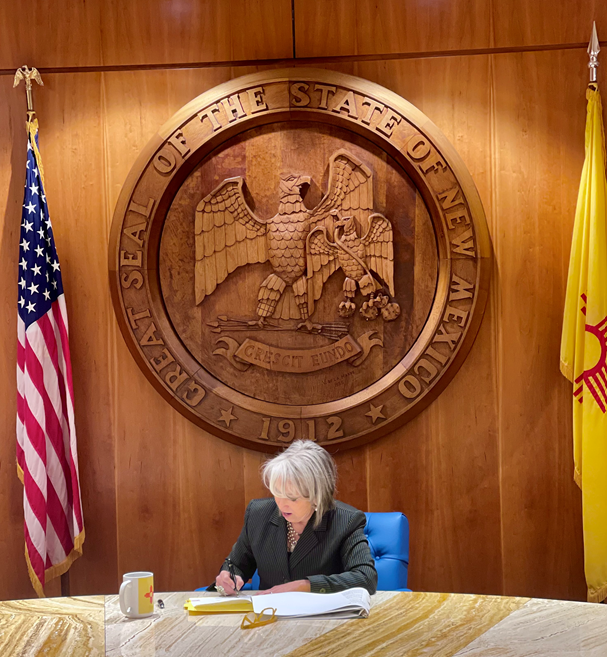| SLIMMED-DOWN TAX PACKAGE SENT TO
GOVERNOR WITH MINIMAL TAX INCREASE |
|
| Whew! After the Senate gutted the House Bill 14 tax package that was fueled by more than $130 million in new taxes, the House refused to concur on the Senate’s amendments to the bill, setting up a six-person conference committee that ultimately produced a compromise that was accepted by both chambers, sending the measure to the governor.
The Chamber has stood firm all session in opposing any kind of tax increases. While we’re disappointed in the tax increase on liquor, this legislation is much better than the original HB 14. We compliment the Senate on holding the line on the oil tax increase and insisting on a package that essentially requires some reprioritization of spending in the state’s budget. It’s a modest but affordable and fiscally responsible approach. Here are some details on the Jenny Craig tax package: • No increased tax on oil production • A 20% tax increase on wholesale liquor, sending $10 million in revenues to the Tribal Alcohol Harms Alleviation Fund • $113 million, to be funded from next year’s budget, for: o $250 per foster parent/guardian personal income tax credit – $8.8 million o GRT exemption for co-insurance payments for medical services – $22.5 million o Increased earned income taxes structured such that taxpayers with a family of three earning $70,000 or less will pay no personal income tax – $81.7 million. A conference committee consists of three senators and three representatives, customarily two from the majority party and one for the minority party. The committee produces a conference report, which is just an amended bill. Two members from each chamber must vote for a conference report for it to be adopted and sent to the respective chambers for final approval. The only choice each chamber has is either to vote for acceptance of the conference report or to reject it. Both the House and Senate must agree on exactly the same version of any bill before it can be sent to the governor. With this action, the Legislature has taken care of the fiscal trifecta – the budget, capital outlay and the tax package. Until next year, that’s that. |
| HOUSE PASSES MEDICAID TRUST FUND,
SENATE CONCURS, SENDS IT TO GOVERNOR |
|
| Friday on the House floor, representatives had a full slate of bills. One of them was Senate Bill 88, Medicaid Trust Fund, sponsored by Sens. George Muñoz (D-Cibola, McKinley & San Juan), William Sharer (R-San Juan), Pat Woods (R-Curry, Harding, Quay & Union), Elizabeth “Liz” Stefanics (D-San Miguel, Santa Fe, Torrance & Valencia) and Rep. Pamelya Herndon (D-Bernalillo). The bill creates a new Medicaid Trust Fund, which would be seeded with a $300 million appropriation from the general fund.
A Senate Finance Committee amendment to SB 88 adds a provision requiring money in the fund be appropriated to support the state Medicaid program if a reduction in federal Medicaid funding received by the state will cause a reduction in coverage or benefits below the levels provided as of the effective date of the act. There would be $300 million a year put into the fund until it gets to $2 billion, and then the state will stop putting money into it — this is when the fund starts to draw off of the interest and fund itself.
The Greater Albuquerque Chamber of Commerce has supported the bill through the session because it “aims at ensuring our state can sustain the Medicaid program regardless of whether or not there are federal reductions.”
A motion was made by Herndon for a “do-pass” vote as amended. The House floor voted 52-13 to move the bill back to the Senate for concurrence, where it was approved. It now heads up to the governor. |
| OH, FAIR NEW MEXICO! LEGISLATURE APPROVES FAIRGROUNDS DISTRICT ACT |
|
| After much discussion, it’s clear there is substantial interest in redeveloping the New Mexico State Fair property. On Friday night, the House floor heard Senate Bill 481, State Fairgrounds District Act, which calls for the creation of a state Tax Increment Development District (TIDD) that will implement a path forward in developing the 200-plus acres.
The bill is sponsored by Senate President Pro Tempore Mimi Stewart (D-Bernalillo) and was presented on the House floor by Rep. Janelle Anyanonu (D-Bernalillo) — who, like Stewart, also represents the district containing the state fairgrounds. Anyanonu said the plan is to create a district that captures the gross-receipts taxes generated on the real estate owned by the state, including gaming taxes generated from the racino, to ensure the money is spent there. A half-million-dollar request for proposal (RFP) was appropriated last year and has been issued by the General Services Department to develop a master plan for the area. “The legislation will allow for bonds backed by the gross receipts and gaming tax proceeds. If no bonds are issued, after four years, all monies will revert back to the general fund.” Anyanonu said the bill does not decide if the fair should stay or move. “It doesn’t authorize the sale of state land, and it does not cede state control any more than any other TIDD; because it is state land, the Legislature will have even greater control over that land than under a traditional TIDD.” Rep. Jack Chatfield (R-Colfax, Curry, Harding, Quay, San Miguel & Union) questioned how much community input has been taken in planning for the project and if the Downs Racetrack and Casino will stay. Anyanonu said the community has been involved from the beginning. Understandably, she also didn’t know too much about a definite master plan because the RFP is still out, but the racino has a 20-year agreement. The Chamber is a strong supporter of this legislation because when the area is revitalized, it will make those neighborhoods safer and increase home and property values. Moreover, revitalization will attract commercial/retail stores back to the area as well as construction of affordable housing. The Chamber also has confidence in the multiple safeguards in the bill against conflicts of interest. The board consists of mostly elected officials, and all proceedings of the board are done in the open, including written documents. The Board of Finance and the New Mexico Finance Authority must oversee and review the district’s proposals and approve them. Finally, before any bonds can be issued, the Legislature itself must approve. And, the district self-destructs in four years if progress has not been made. Many Republicans continued to question whether there are enough safeguards built in to avoid conflicts of interest. Anyanonu said all the meetings of the newly formed governing board — which will be representatives of the district — of the district must adhere to all open meetings and records acts. After an hour of debate, Anyanonu closed by saying “the International District and surrounding area has been an area affected by crime and (with this bill) we are actually taking some time and taking an opportunity to invest in this community in a real way for the first time in decades.” The House floor gave a “do pass” to the bill, officially Senate Tax Business & Transportation Committee Substitute for Senate Bill 481 as amended, by a vote of 39-26 along party lines. The bill now goes to the governor for her approval. |
| KEY UTILITY SITE READINESS BILL IS READY FOR THE GOVERNOR’S SIGNATURE |
|
| Friday on the House floor, Senate Bill 170, sponsored by Majority Whip Sen. Michael Padilla (D-Bernalillo) and Reps. Meredith A. Dixon (D-Bernalillo) and Joseph Franklin Hernandez (D-San Juan) passed the House 68-0, returning it to the Senate for concurrence on amendments. The Senate concurred later in the day, sending SB 170 to the governor.
The bill empowers the Public Regulation Commission to allow public utilities to recover prudent and reasonable costs for certain economic development projects, requires the Economic Development Department to certify projects will support reasonably anticipated economic development in the state and authorizes the PRC to issue expedited orders. This bill complements Senate Bill 169, site readiness.
The Chamber has supported the bill along its journey through the Legislature, saying it “allows New Mexico to do the literal groundwork necessary to be truly ready when economic development opportunities arise. Allowing public utilities to recover prudent and reasonable costs for certain economic development projects will encourage investment in future projects today.” |
| WRONG-HEADED PREVAILING WAGE ON IRB PROJECTS IS NOW IN EXECUTIVE’S HANDS |
|
| We told you last night (it was actually early this morning) that Senate leaders would fast-track House Bill 6 IRB Prevailing Wage to the Senate Floor. The bill, co-sponsored by House Majority Floor Leader Rep. Reena Szczepanski (D-Santa Fe) and Senate President Pro Tempore Mimi Stewart (D-Bernalillo), was among the first bills voted on in the Senate on Friday morning. It was approved along party lines, 23 to 15, with Republicans voting against it. With no Senate amendments or substitutions, it is ready for the governor’s yay or nay.
HB 6 requires paying prevailing wage rates on Industrial Revenue Bond (IRB) projects. Rep. Larry Scott (R-Chaves, Eddy & Lea) summed up the Chamber’s feelings about this proposal, “This is bad public policy and will result in fewer public projects and fewer jobs if it is enacted.” Stewart defended her bill, saying, “It will increase the cost, but not by that much. If they (developers and construction companies) don’t want to pay it, they don’t have to do their project.” Bingo. That’s exactly what we’re worried about. |
| GOV.’S STRATEGIC WATER SUPPLY IS A GO |
|
| This morning the Senate approved House Bill 137, the Strategic Water Supply Act, on a 33-6 vote, sending it to the governor. The bipartisan bill, a priority for the governor, is sponsored by Rep. Susan Herrera (D-Rio Arriba, Sandoval, Santa Fe & Taos), Sen. George Muñoz (D-Cibola, McKinley & San Juan), Rep. Rod Montoya (R-San Juan), and Sen. Craig Brandt (R-Sandoval).
The bill accelerates the treatment and use of brackish (salty) water often found in deep aquifers. The town of Cuba, for example, is facing dire water shortages and is preparing to install a desalination (de-sal) plant. The bill is aimed at helping fund these kinds of projects and advance scientific work at New Mexico Tech and New Mexico State University. Tech is working on characterizing aquifers throughout the state – geological mapping to understand possible effects of tapping brackish aquifers. NMSU is working on how to improve treatment technology. The Chamber has supported HB 137 from the beginning. We need the research and development as well as aquifer characterization provided in this legislation. We also need to get some projects off the ground. We’re glad to see this bill move up to the fourth floor today. |
| RACKETEERING BILL SEES NO OPPOSITION ON HOUSE FLOOR, HEADS TO GOVERNOR |
|
| As the House found its groove Friday morning, Senate Bill 70, Racketeering Act: 13 New and Additional Crimes, sponsored by Sen. Craig Brandt (R-Sandoval), received a “do-pass” recommendation from the House floor on a 60-0 vote.
The bill amends the Racketeering Act to include 11 additional crimes within the definition of “racketeering,” defines “criminal gang” and creates two felony crimes related to membership or participation in racketeering activities of criminal gangs and other enterprises. The bill — which had a committee substitute in the Senate Judiciary Committee — includes sexual exploitation of children, criminal sexual penetration, criminal sexual contact, dogfighting, bringing contraband into places of imprisonment and human trafficking. Cockfighting was added back to SB 70 as a crime that could be prosecuted as a RICO violation.
The Chamber strongly supports this legislation as “the bill would also target the leaders of such enterprises, specifically making it a crime to solicit or coerce another person, including a minor, into being a member of or working with their criminal enterprise, as well as financing or supervising racketeering activity.”
With the unanimous vote, SB 70 heads to the governor’s desk. |
| EMBEZZLEMENT PENALTY BILL FLIES OFF THE HOUSE FLOOR WITH A 64-0 VOTE |
|
| With less than a day left, representatives on the House floor got off to a rocket start Friday morning, hearing a full plate of bills. Senate Bill 155, Determination of Embezzlement Penalty, sponsored by Sen. Antonio “Moe” Maestas (D-Bernalillo), received no discussion or opposition, garnering a 64-0 vote from the House. With the approval, it heads to the governor’s desk.
The Chamber has supported this bill throughout its journey because it’s a common-sense measure that gives law enforcement and prosecutors an additional tool to go after embezzlers. Prosecutors would be able to aggregate crimes against any one victim, punishing all embezzlements within a one-year period as one crime, rather than treating each as a separate instance, and would aggregate the value of embezzled items to determine sentencing. This is much like the law on retail theft, which has worked because it goes after the repeat offenders and can raise the penalties imposed to a serious felony level. The Chamber is thankful to see this get to the end. |
| BILL CLEANING UP DWI SENTENCING ‘GOOD TIME’ PASSES LAST LEGISLATIVE HURDLE |
|
| House Bill 102 Violent Felonies for Meritorious Deduction was presented on the Senate Floor today by Sen. Antonio “Moe” Maestas (D-Albuquerque). Retired District Attorney Rep. Andrea Reeb (R-Chaves, Curry & Roosevelt) carried this bill on the House side. It corrects an oversight in state law that gives more “good time” than intended to those in prison for killing someone as the result of a DWI.
This bill doesn’t stiffen penalties; that question was settled in 2016. Sen Harold Pope (D-Bernalillo) asked, “We already made the decision on the severity of this felony, this just sounds like clean-up on the statute?” Maestas replied, “Senator, it really is. It’s just that. Cleanup.” Sen. Shannon Pinto (D-McKinley and San Juan), asked, “What about self-driving vehicles?” Maestas paused a second, then said, “Madam Senator, the car would be eligible for good time.” The bill passed with no opposition, and is taking a self-driving car up to the fourth floor. |
| SENATE MAKES AN 11TH-HOUR THIRD RUN
AT FIXING ‘HARM TO SELF AND OTHERS’ |
|
| The phrase “If at first you don’t succeed, try, try again” is a proverb that encourages perseverance and resilience, suggesting that repeated attempts are necessary to achieve success.
Last night we told you that Senate Bill 510 was transformed from its original form into a replica of Senate Bill 166, which gives judges more clarity in dealing with people facing serious behavioral health issues to the point they are a danger to themselves or others. We’re talking about those cases that can lead to serious harm and stories that shake our community. The original SB 166 was stuffed in a House “kill committee” and died. The House took this new effort and stuffed it into three kill committees, killing it yet again. Today, a bipartisan coalition of senators once again took an existing bill, this time a House bill dealing with something completely unrelated, and amended the bill into, once again, a SB 166 carbon copy. HB 149, Supported Decision-Making Act, creates an alternative to guardianships for adults with disabilities or who otherwise need help managing their affairs. The core of the bill is still there, but the bill now also includes the behavioral health solutions that the House has seemingly cratered twice. Today the Senate ultimately passed HB 149, with extra freight aboard, on a 37-1 vote. This sets up the House for a difficult decision. Do members agree with the changes made by the Senate and make the behavioral health components law? Or do they vote down a bill that in its original form was championed by one of their members and successfully moved through the process to the very end? We’ll find out in the next few hours. There’s a significant amount of maneuvering happening here. A handful of senators was critical of the process, complaining the Senate should honor the House’s decision to not move what amounts to SB 166 forward. They said that they were elected by their constituents to represent them honorably and get a job done for them, and that their constituents wouldn’t accept a tactic like this one. Supporters of the behavioral health changes, including Senate Minority Leader Bill Sharer (R-San Juan), Sen. Antonio “Moe” Maestas (D-Bernalillo and sponsor of SB 166), and Sen. Katy Duhigg (D-Bernalillo) were unfazed. Sharer said, “We have people that clearly need help. How do we provide that? How do we help them? How do you help people in crisis? You can arrest them, take them to a judge, they’ll be released, and they’re still in crisis.” Basically, their interpretation is, “We were also elected by our constituents to get a job done. And our constituents want this Legislature to do something about helping our neighbors who are going through mental health issues.” Like we said, if at first you don’t succeed, try try again. Let’s hope this third time is the charm. |
| PROTECTING NEWBORNS EXPOSED TO DRUGS AMENDED, RETURNS TO SENATE |
|
| Friday evening, the House floor came back from break to hear Senate Bill 42, CARA Program requirements, sponsored by Majority Whip Sen. Michael Padilla (D-Bernalillo) and Minority Floor Leader Rep. Gail Armstrong (R-Catron, Sierra, Socorro & Valencia). The bill amends the Children’s Code to provide new guidelines for Plans of Safe Care for newborns who exhibit symptoms consistent with prenatal drug exposure. The measure also transfers certain duties from the Children, Youth and Families Department to the Department of Health.
Over the course of its journey, the bill has had committee substitutes from both Senate Rules and Senate Judiciary. It now makes the Department of Health (DOH) the lead agency with more specific expectations about the roles and responsibilities of care coordination. It also makes DOH responsible for ensuring the completion of federally required reporting related to plans of safe care, developing an annual report related to the creation and implementation of plans of safe care for the Legislature, and delivering training. The bill also provides DOH with rule-making authority.
On the House floor, Majority Floor Leader Rep. Reena Szczepanski (D-Santa Fe) made an amendment to the bill. The floor amendment strikes the House Judiciary Committee amendments that addressed electronic records retention by CYFD. It replaces them with new, slightly different, material relating to CYFD’s electronic records. It also adds provisions to the guidelines for plans of safe care for newborns with symptoms of substance exposure; these provisions require that written plans of safe care be sent within 24 hours of discharge to the Indian tribe of a parent or caretaker of such a newborn who resides on tribal land, and require HCA to communicate and consult with an Indian child’s tribe to ensure plans of safe care are developed in a culturally responsive manner for each child. The floor amendment also makes information concerning a party to an abuse or neglect proceeding confidential and closed to the public. Exceptions are made for release of redacted information for research or certain investigations, and release of all information for research or certain investigations in the case of a fatality. These are new provisions on electronic records and retention: • Employees of CYFD may not erase data from electronic devices issued by CYFD for communication related to their duties. • By Jan. 1, 2026, CYFD shall implement a system (approved by DoIT) to back up all electronic records generated or received by CYFD employees daily. • Records must be retained for at least seven years after an employee’s termination. • CYFD must back up retained records daily, monthly, and annually. The Chamber has supported the bill along its journey because from the Legislative Finance Committee analysis, New Mexico isn’t reaching mothers with substance abuse through the current system. The LFC data tells us that rates of newborns with substance-withdrawal symptoms in New Mexico have climbed to more than twice the national average. Yet only one in seven local families with substance-exposed newborns accepts referrals to addiction treatment. The Chamber also said in our Legislative Agenda we support measures to deliver “greater transparency and accountability to know the full extent of the problems with CYFD.”
A motion was made for a “do pass” as amended, and with a vote of 59-2, the bill goes back to the Senate for concurrence. |
| HOUSE REJECTS SMART SCIENCE OF READING AMENDMENT, SENDS BILL BACK TO SENATE |
|
| Education in New Mexico is a hot-button issue. On Friday night, representatives on the House floor heard House Bill 167, Higher Ed Payment for Certain Tests, sponsored by Reps. Joy Garratt (D-Bernalillo), E. Diane Torres-Velásquez (D-Bernalillo) and Sen. Nicole Tobiassen (R-Bernalillo). The bill was back on the House floor after clearing the Senate — with changes.
The bill makes GED testing for adults free in New Mexico, and we’ll admit it wasn’t a bill we were watching closely. Until a couple days ago, that is. The Senate Finance Committee made some major amendments to the bill, basically building in an entire Science of Reading component.
Garratt said the original bill has been discussed for a long time by higher education to further the work of students who are now seeking a high school diploma. She said of the amendment from the Senate about structured literacy for prep programs has “been discussed quite a bit over the last two years; elementary teachers have been required to study structured literacy. The PED in October 2023 mandated that in October 2024, the education programs would teach the structured literacy system. So we’ve studied it, and we’ve learned about it. The specific bill to which the amendment was amended was not precisely studied during the interim.” The Chamber has supported Senate Bill 242 Science of Reading Act throughout the session; that bill got bottled up in House Education. The Chamber has long been involved in efforts to help lift student achievement. Through all that work, going back almost two decades, we know how critically important learning to read is. It’s one of the reasons we started the Albuquerque Reads program, staffed by volunteers reading to children helping them to love reading. The current method of teaching simply hasn’t worked. After decades of research, including brain science, there has emerged effective strategies of teaching kids to read. It’s said that the science of reading is the converging evidence of what matters and what works in literacy instruction. We believe this is the right direction.
During discussion, six representatives questioned the Senate amendments. Rep. Susan K. Herrera (D-Rio Arriba, Sandoval, Santa Fe & Taos) questioned the amendment from the Senate Finance Committee that added structured literacy because a “one-size-fits-all” approach doesn’t work for everyone. “I’m just trying to figure out how this all came about when we were just trying to get all our kids’ tests covered. I just think, frankly, we have sent other bills back in concurrence. We certainly sent a big tax bill back, and I think we don’t have to accept everything. I think we should vote for this to go back for debate with the Senate.”
A motion was made to accept the concurrence, and it failed on a vote of 16-45. The bill goes back to the Senate asking the body to recede from its amendments. We’ll keep an eye out on what happens to this bill next. |
| SCHOOL DISTRICT CELL PHONE POLICY BILL GETS ITS FINAL LEGISLATIVE OK |
|
| The Senate quickly concurred with a House amendment to Senate Bill 11, Anti-Distraction Policy in Schools, on a unanimous voice vote today. The final approval came quicker than you can order a Dion’s pizza on their app from your phone.
Phones have become an intractable part of our lives. But minimizing phone use in our classrooms can increase proficiency rates and minimize the mental health crisis plaguing our teenagers.
The bill has one mandate, a conversation in every single school district community to come up with a policy for that school district. We’re glad the signal connected for this bill every step of the way, and it’s headed to that fourth floor desk where our governor sits. |
| GOV. SIGNS OFFICE OF CHILD ADVOCATE ACT, ADVANCING CYFD TRANSPARENCY |
|
| It’s no secret that Gov. Michelle Lujan Grisham has been on a very public mission to improve public safety as well as behavioral health laws in the state. On Friday, Lujan Grisham signed House Bill 5, Office of Child Advocate Act, sponsored by Rep. Pauline Abeyta (D-Bernalillo, Cibola, McKinley, San Juan, Socorro & Valencia) and House Speaker Javier Martinez (D-Bernalillo).
In short, the bill sets up an independent office to monitor the Children, Youth and Families Department, intervene when appropriate and provide much greater transparency about how well CYFD is protecting children and delivering services to the child and family. Amendments made on the Senate floor appear to have satisfied the governor’s concerns. However, before signing the bill, Lujan Grisham voiced sharp criticism of both lawmakers and Attorney General Raúl Torrez for pushing the bill in what she described as a political vendetta. We would stay out of that fray and simply refer once again to the Chamber’s Legislative Agenda, in which we advocated for reforms to ensure “greater transparency and accountability to know the full extent of the problems with CYFD.” That is what matters to New Mexicans and the children entrusted to CYFD’s care. With the bill signed, the new Office of the Child Advocate will be created within the state Department of Justice in July. The director of that office will be appointed by the governor but be subject to Senate confirmation. |
|
|
| SIGNING OFF FROM SANTA FE |
|
| The picture says it all – pretty much the way everyone is feeling at this time of the night/morning. Not exactly bright-eyed and bushy-tailed. But, it’s all over tomorrow at noon. As we write this, the House has recessed until 8:30 a.m. tomorrow and the Senate will come in at 8 a.m., although, they are still on the floor as we’re wrapping up our newsletter for the night… er morning! We’ll be bringing you one last Legislative Roundup later today (Saturday) with last-minute actions and a 30,000 foot look back at the first session of the 57th Legislature. Until then, thanks for being with us. |



















